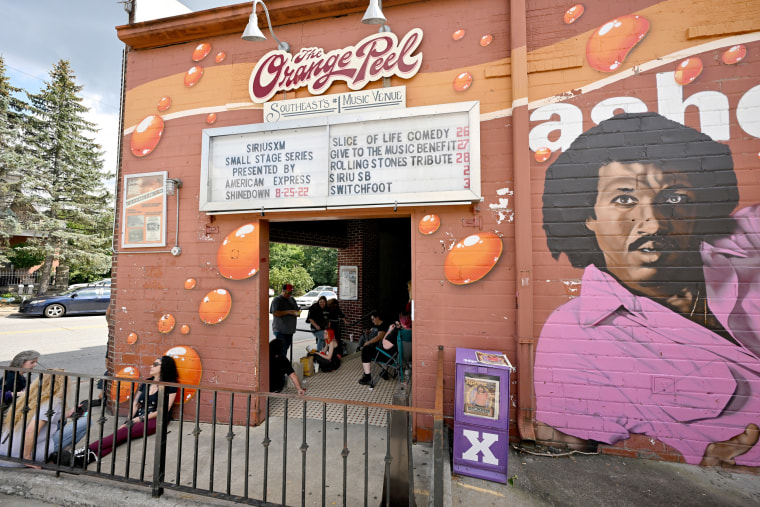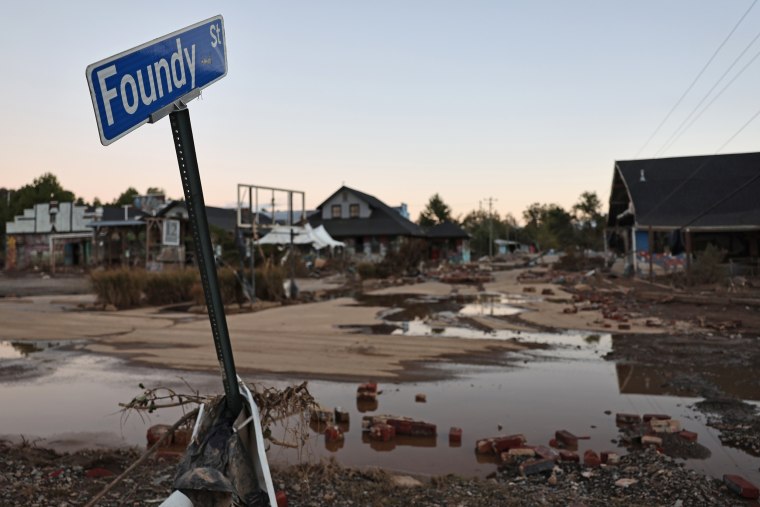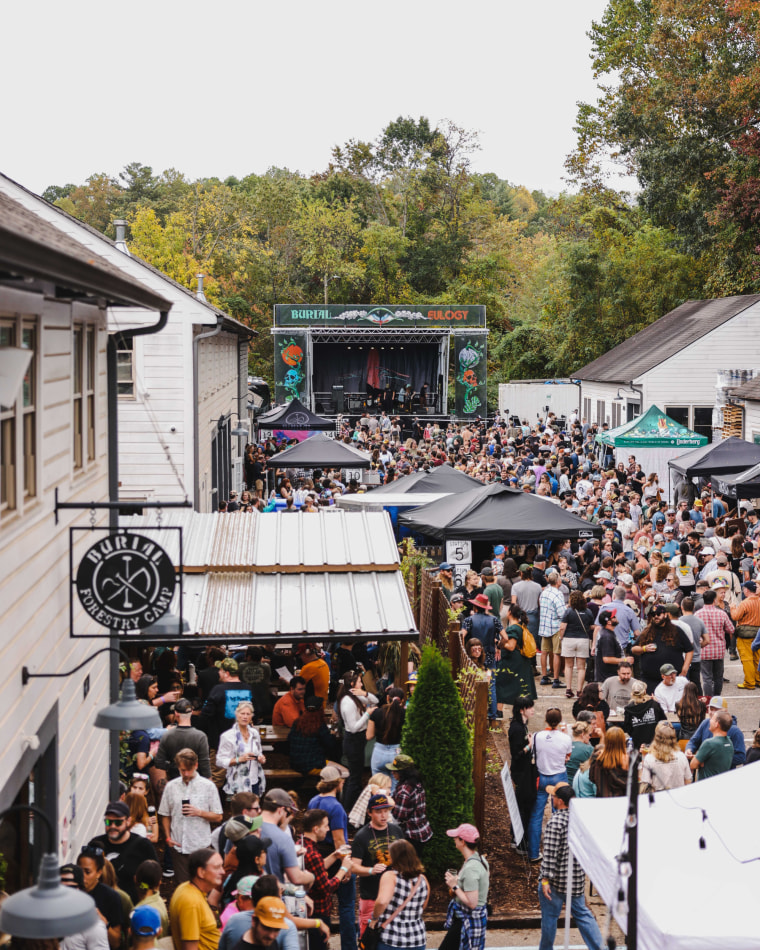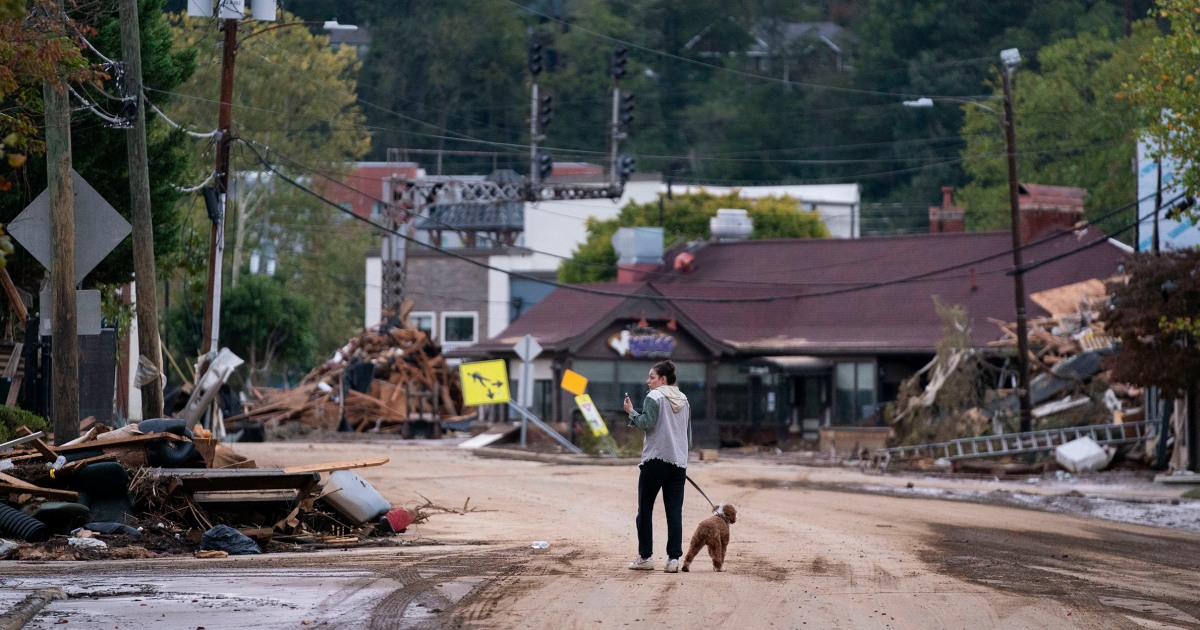Last Tuesday, Kenny Clark packed his three dogs and 20 guitars into the back of his car and headed west to Nashville, Tennessee, where he planned to raffle off the instruments for hurricane relief.
“We had these couple days of overwhelming sadness and anxiety and confusion and wanting to help and not knowing what we could do,” said Clark, who co-owns and manages Asheville Guitar Pedals, a shop in the North Carolina city that Hurricane Helene tore through nearly three weeks ago.
The store experienced minimal damage but has been closed since the storm. Clark said he wasn’t sure at first where to start pitching in on rebuilding efforts, “and then Miranda, my partner, had this idea. It was a no-brainer.”
They helped organize a raffle and benefit concert at Soft Junk, a Nashville venue, over the past weekend that pulled in much-needed donations and helped buoy spirits. But Clark and others in Asheville’s music scene — which has a spunky, up-and-coming reputation — foresee a long recovery ahead.
“We definitely don’t want people to forget about us,” said Liz Tallent, who manages marketing and special events for the Orange Peel and Rabbit Rabbit, two prominent music venues in Asheville.

Like other artists and creatives in the city, musicians are supporting one another through financial and emotional difficulties that won’t be easily resolved.
Many venues are still shuttered, festivals have been canceled, and tourists are largely absent. Some visual artists, especially those based in the vibrant River Arts District, lost entire portfolios, studio spaces and homes in Helene’s floodwaters. A key question now is how to rebuild lives and livelihoods in Asheville as attention on the region wanes.
Tallent said the concert floor of the Orange Peel has become a storage place for pallets of overflow relief supplies, with the venue paying its staff to manage distribution. Non-potable water is slowly returning to downtown Asheville, the city says, though many businesses are still closed or operating with reduced hours or services.
We are doing everything we can to keep our artists here in our community.
Katie Cornell, executive director of ArtsAVL
October is a pivotal time for many businesses in western North Carolina and eastern Tennessee — from whitewater rafting operators who’ve transformed into search-and-rescue crews to hotels and agritourism companies that rely on revenue from leaf-peepers who typically come in droves this time of year.
Many musicians also bank on the fall season’s performance schedule to stay afloat through the winter, said Katie Cornell, executive director of ArtsAVL, Asheville’s arts council. She said she has heard frequent concerns from artists about storm-damaged cars, which they need to get to shows that are still being booked.
“We are doing everything we can to keep our artists here in our community,” she said. “We’re very concerned about losing artists.”
Gigs will steadily return to Asheville in a few weeks, Cornell expects, but it could be a while before visitors from farther away can get to them. A destroyed section of Interstate 40, the main highway connecting Asheville with Tennessee and beyond, will remain closed through at least January.

Asheville has a well-established festival scene that pulls in tens of millions of dollars collectively for artists and musicians, restaurants and breweries, accommodation operators and other vendors every year, Cornell said. Many of those events take place in the fall, and several have already been canceled.
Tim Gormley, who co-owns Burial Beer Co., decided to scrap Burnpile, a music and beer festival that he called his company’s annual “Super Bowl” event.
“It’s not a huge revenue driver, honestly, but it’s very meaningful to us,” he said.
Gormley runs five locations and a music venue spread across Asheville, Charlotte and Raleigh. The properties weren’t significantly damaged by Helene, he said, but fewer than half of his 130 employees are working right now; like many businesses, his has had to furlough some of them.

The Goombay Festival, which showcases Black music, art and food, has also been canceled this year, said Anthony Thomas, the board chair of the YMI Cultural Center, which has hosted the event since 1982. YMI itself has an even longer legacy — founded in 1893, it’s one of the oldest African American community centers in the country.
The festival was scheduled for the Friday after Helene hit, and canceling it meant losing tens of thousands of dollars in planning expenses, as well as a grand reopening for the YMI site after a six-year, $6.4 million renovation.
But the gathering’s value goes beyond its costs, Thomas said.
“A lot of folks who come to Asheville, one of the first things that they will ask is ‘Where are all the Black people?’” he said. The Goombay Festival is a space where the Black community “gets to see themselves on display in downtown Asheville — their music, their food, their art, an opportunity to display their goods.”

Leave a Reply